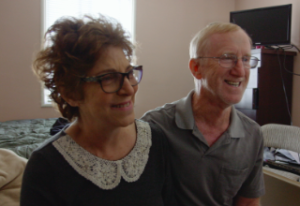Feb 10
The Burden and Stress of Caregiving- Don’t go it alone!

GlobeDocs, a Boston Globe documentary film community with monthly screenings, conversations with filmmakers, and an annual film festival, recently screened and discussed the short film, Caregiver: A Love Story, produced and directed by palliative care physician, Dr. Jessica Zitter. The film shares the story of one man, Rick, struggling to care for his dying wife, Bambi. Bambi had terminal cancer and decided it was time to stop treatment and come home to die. Rick became her primary caregiver with the goal of “giving her the best care I can give her.” In Meredith Goldstein’s (Boston Globe columnist) discussion with Dr. Zitter, she declared “…when I set out to make this movie, I thought it was going to be about a ‘good death’ at home. What happened was a surprise! It is about caregiver burden.”
Rick quit his job to take care of Bambi. It was a role that stressed Rick physically, emotionally, and financially. After weeks of being up with Bambi two to four times per night, Rick was weary. He felt his health deteriorating. There was never time to rest. When he wasn’t caring for Bambi, there were numerous other tasks and chores to be done. As fatigue set in and Bambi grew weaker, Rick was lonely and had feelings that he just wanted to get on with his life. He felt that “this wasn’t what he signed up for.”
It is hard for any caregiver to know ahead of time what the experience will include but it is important to discuss and figure out better ways to support caregivers. Rick couldn’t afford to hire a caregiver and other family members were unable to help due to their own life circumstances. Hospice was there to provide relief for Bambi’s pain and help make her final days more meaningful, but their role didn’t include help for the caregiver. Eventually, Rick got sick and Medicare paid for Bambi to stay in a nursing home for five days while Rick recovered. He felt guilty but it was necessary because he couldn’t take care of Bambi unless he rested and recovered.
Being a caregiver giver is very difficult. Rick asked himself, why am I doing this, and his answer was, “it is about love.” Dr. Zitter’s goal with this film is to share the profound consequences on caregivers and advocate for more support for them. For Rick, the caregiving role for Bambi lasted nine weeks and it took months after that to recover from the impact on his well-being. Dr. Zitter said that on average a caregiver’s role lasts about four and a half years.
It is vital that caregivers who lovingly take on this role have support. Zitter is advocating for action nationally and at the community level. She notes that Rick and Bambi’s faith community stepped up in practical ways. She suggests that any group wishing to help caregivers create lists of ways to help and share it with the caregiver to see what they need. “It is different for every caregiver but there are so many things that can be done.” The list might include laundry, grocery shopping, picking up prescriptions, cleaning out the refrigerator and other cleaning. Caring for their loved one is what the caregiver wants to focus on but there are many other tasks that can be delegated. If you would like to learn more about Dr. Zitter’s film and advocacy, go to https://www.caregiveralovestory.com/
Springwell is fortunate to have an established program to support caregivers. Springwell’s Caregiver Support Program helps those who provide care make informed decisions, solve problems, reduce stress, and maintain overall physical and emotional health. Contact us to learn more.
*Photo of Bambi and Rick from Caregiver: A Love Story website https://jessicazitter.com/caregiver/


